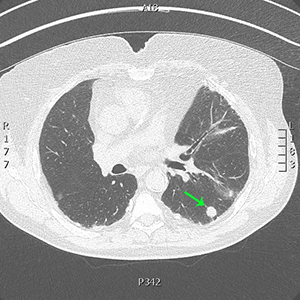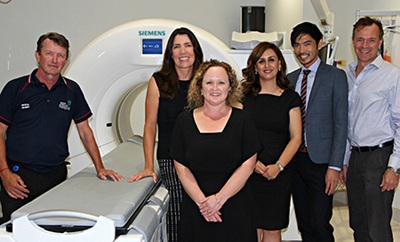Occupational and Respiratory Health Research
About
Occupational lung diseases came into prominence with the industrial revolution and, despite legislation and a significant reduction, they continue to be problematic, with some ‘old’ diseases re-emerging due to the introduction of new technologies.
The Occupational and Respiratory Health Research Group is investigating sensitive screening methods to identify workers early enough to implement curative treatment, as well as investigating novel therapies for those with occupational lung disease as well as lung cancer generally.
The dedicated team is committed to assisting in the search for new and improved treatments and providing high-quality care for patients with lung cancer and occupational-related respiratory diseases, such as mesothelioma.
The group has an excellent track record in attracting competitive research grants, both from Australian and international sources. The team are recognised as world leaders and have an extensive collaborative network with the leading researchers in lung cancer screening throughout Australia and internationally.
Recent highlights
- Cancer Council WA grant awarded to Professor Fraser Brims for a phase II feasibility study comparing primary care vs. hospital-based follow up after curative surgery for patients with non-small cell lung cancer.
- Cancer Council WA grant awarded to Professor Fraser Brims for research into cancer-related weight loss in patients with mesothelioma.
Current research projects
Asbestos Review Program
It is known that people who have been exposed to asbestos have a greater chance (but still a small one) of developing cancer of the lung and mesothelioma (cancer of the lining of the lung). At present, the only known actions that can be taken to reduce these risks are to stop smoking and avoid further contact with asbestos.

The Asbestos Review Program (ARP) is a dedicated clinic for people who have worked with, or who have had significant exposure to, asbestos.
The clinic has been running since 1990 and specialises in dealing with asbestos-related lung diseases. At the ARP we arrange an annual health check-up using specialist breathing tests, blood tests and, the latest CT scan technology. The careful use of a low-dose CT scan of the chest can identify lung cancer at an early stage when it is potentially curable and the ARP offers this test. We also have many years of experience in dealing with other lung diseases that asbestos exposure can cause.
The clinic can only accept people who have worked in a job where they have been exposed to asbestos for more than 3-months of full-time work. We also look after those who have x-rays or CT scans showing evidence of asbestos exposure (usually ‘pleural plaques’) and those who ever worked or lived in the asbestos mining town of Wittenoom.
An appointment will be made for you to attend our clinic in the Department of Respiratory Medicine, Ground floor, B-block, Sir Charles Gairdner Hospital. You will also be asked to attend for a CT scan at Envision Medical Imaging in Subiaco. Information forms will be sent to you to complete at home and bring with you. The first appointment forms are quite detailed and may take up to 45 minutes to complete, after this the annual forms are much quicker. For more information please contact the team on 08 6457 2922 or email arpadmin@uwa.edu.au.
The ARP Team
• A/Prof Fraser Brims
• Clin/Prof Bill Musk
• Prof Nick de Klerk
• Dr Ed Harris
• Dr Peter Franklin
• A/Prof Alison Reid
• Deb Hall
• Lucie Conte
• Nola Olsen
International Lung Screen Trial
The International lung screen trial (ILST) is a big international study aiming to recruit more than 4,000 participants, with 2000 coming from Australia, and 500 from Perth. Other centres in Australia are Brisbane (where the study is based), Sydney and Melbourne. The aim of the study is to understand the best way of choosing high-risk people for lung cancer screening and also the best way of following up with repeat CT scans. There are a number of sub-studies from ILST, including our own in WA examining the best way to recruit people into a lung cancer screening program.
Lungscreen WA

When lung cancer is caught at an early stage it is potentially curable. Results from previous studies have shown that there is great promise in screening for early lung cancer using low dose CT scans, yet there are many questions that need answers before it will be adopted more widely.
Over the past two years, the Occupational and Respiratory Health Research Group, led by A/Prof Fraser Brims, ran a pilot project to better understand some of the challenges for screening for early lung cancer using low-dose CT (LDCT) scanning. All the scans were performed in community radiology centres and tested different ways of choosing who is at risk of lung cancer and therefore who should get an LDCT. The group also tested a different way of following up repeat CT scans using a protocol to guide decisions. The results of this study will help inform policy-making within WA and Australia.
The LungScreen WA Team
- A/Prof Fraser Brims, Co-Principle Investigator, Sir Charles Gairdner Hospital
- Dr Annette McWilliams, Co-Principle Investigator, Fiona Stanley Hospital
- Dr Conor Murray, Research Fellow
- Dr Dave Manners, Research Fellow
- Jacqui Logan, ILST Study Manager for WA
- Siobhan Dormer, Research Nurse
- Dr Kuan P Lim, Research Fellow
- Dr Ed Harris, Research Fellow
Top publications
- Reid A, Franklin P, Berry G, Peters S, Sodhi-Berry N, Brims F, Musk AW, de Klerk NH. Are children more vulnerable to mesothelioma than adults? A comparison of mesothelioma risk among children and adults exposed non-occupationally to blue asbestos at Wittenoom. Occup Environ Med. 2018 Dec;75(12):898-903.
- Reid A, Franklin P, de Klerk N, Creaney J, Brims F, Musk B, Pfau J. Autoimmune antibodies and asbestos exposure: Evidence from Wittenoom, Western Australia. Am J Ind Med. 2018 Jul;61(7):615-620.
- Manners D, Wilcox H, McWilliams A, Piccolo F, Liira H, Brims F. Current lung cancer screening practice amongst general practitioners in Western Australia: a cross-sectional study. Intern Med J. 2018 Jan;48(1):78-80.
- Reid A, Merler E, Peters S, Jayasinghe N, Bressan V, Franklin P, Brims F, de Klerk NH, Musk AW. Migration and work in postwar Australia: mortality profile comparisons between Australian and Italian workers exposed to blue asbestos at Wittenoom. Occup Environ Med. 2018 Jan;75(1):29-36.
Help us continue our vital research by making a donation today.